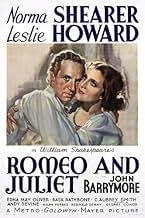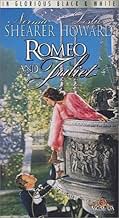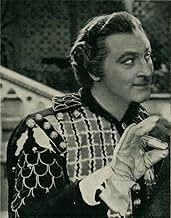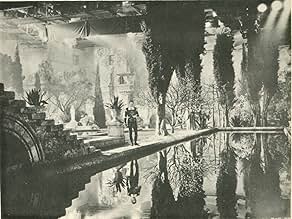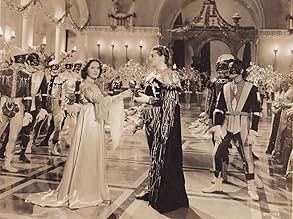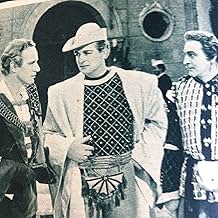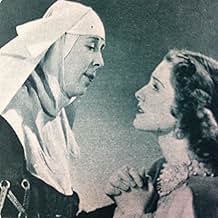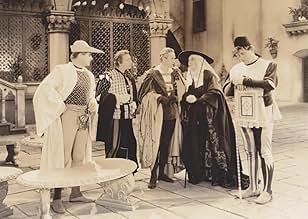IMDb-BEWERTUNG
6,4/10
2352
IHRE BEWERTUNG
Füge eine Handlung in deiner Sprache hinzuYoung love is poisoned by a generations long feud between two noble families.Young love is poisoned by a generations long feud between two noble families.Young love is poisoned by a generations long feud between two noble families.
- Regie
- Drehbuch
- Hauptbesetzung
- Für 4 Oscars nominiert
- 4 Gewinne & 5 Nominierungen insgesamt
Charles Bancroft
- Nobleman
- (Nicht genannt)
Dean Benton
- Minor Secondary Role
- (Nicht genannt)
Carlyle Blackwell Jr.
- Tybalt's Page
- (Nicht genannt)
John Bryan
- Friar John
- (Nicht genannt)
Empfohlene Bewertungen
The lavish treatment given to this by MGM and Irving Thalberg (his final production showcasing his wife Norma Shearer as Juliet) does work, as do the mature lovers and their supporting cast (Leslie Howard fitting the part of Romeo perfectly, John Barrymore and Basil Rathbone out-swashing each other as Mercutio and Tybalt), Edna May Oliver as the Nurse, typically loud, and Ralph Forbes as a bizarre Paris (no, I can't see why Juliet would want to marry him either, despite her parents' wishes). The music is lovely, despite being stolen from more classical stuff, the settings are perfectly in tune, the verse is spoken with some feeling and inspiration. Why this version doesn't get seen more often I don't know (not even on video in the UK).
The Adrian (and Messell) costumes are magnificent. The sets & cinematography are beautifully realized & director George Cukor does the best he can with what he has been given but the absurd casting of actors 20 years, or more, too old cannot be ignored. Juliet is supposed to be around 13 & Norma Shearer is in her mid 30s. Romeo is to be approximately 16. Leslie Howard is in his mid 40s. The foolish, romantic & tragic path taken by Romeo & Juliet is because of their youth. With these 2 way too old actors, it makes the characters behave as if they are developmentally challenged. It is not how adults behave. I'm am not a student of Shakespeare but I've read the play. Many necessary cuts were made to the text in order to get it to the screen or it would've ended up being over 4 hours long. I don't complain of these cuts. I don't complain of the line readings by some actors. I respect how the studio & Thalberg put the money & attention to detail into the production. Accomplished Shakespearean acting coaches were brought in to get the best performances from the actors. I believe Norma Shearer worked hard to do her best but oh my. She is not Juliet. Leslie Howard is ok but both wouldve been better cast as Lord and Lady Montague or Lord and Lady Capulet. It is a lush & lavish production. I can admire it as a beautiful elegant bauble. If I don't pay close attention to the actors, I can enjoy the spectacle but I cannot accept Shearer & Howard as the lead characters. It's a distraction I cannot pretend isn't there. That they are too old is a valid reason to critique the movie harshly.
The fine cast and production make this adaptation of "Romeo & Juliet" a satisfying one, both as a movie and as a realization of Shakespeare's play. Most of the cast is matched up very well with their characters, and the lavish settings provide a good backdrop for the drama.
Although it's soon clear that Leslie Howard and Norma Shearer are quite a bit older than the original characters were, in other respects they are well cast. Shearer's eager innocence and Howard's refinement fit together well, and although they are clearly not the teenage characters of the original, their romance is believable and convincing in itself.
The other roles include some nice casting. Reginald Denny as the loyal Benvolio, Basil Rathbone as the hard-hearted Tybalt, and Edna May Oliver as Juliet's bustling nurse are all enjoyable to watch. But the highlight of the cast is John Barrymore, who steals every scene as the fun-loving, ill-fated Mercutio, a character who is well-suited to Barrymore's strengths. It's a blessing that at least one of Barrymore's numerous Shakespearean roles was captured in a film for posterity.
The script abridges many of the scenes for cinematic purposes, and it does well in fleshing out the basic story with the duels, festivities, and other events, at times also dramatizing developments that in the original text are only mentioned by the characters. Overall, it is a well-conceived, well-executed, and enjoyable movie version of the famous story.
Although it's soon clear that Leslie Howard and Norma Shearer are quite a bit older than the original characters were, in other respects they are well cast. Shearer's eager innocence and Howard's refinement fit together well, and although they are clearly not the teenage characters of the original, their romance is believable and convincing in itself.
The other roles include some nice casting. Reginald Denny as the loyal Benvolio, Basil Rathbone as the hard-hearted Tybalt, and Edna May Oliver as Juliet's bustling nurse are all enjoyable to watch. But the highlight of the cast is John Barrymore, who steals every scene as the fun-loving, ill-fated Mercutio, a character who is well-suited to Barrymore's strengths. It's a blessing that at least one of Barrymore's numerous Shakespearean roles was captured in a film for posterity.
The script abridges many of the scenes for cinematic purposes, and it does well in fleshing out the basic story with the duels, festivities, and other events, at times also dramatizing developments that in the original text are only mentioned by the characters. Overall, it is a well-conceived, well-executed, and enjoyable movie version of the famous story.
ROMEO AND JULIET, the scions of old Verona's two most powerful families, become the playthings of fate & the fools of fortune.
This was a Very Big Film for MGM in 1936. No (reasonable) expenses spared. Not only was the Studio tackling The Bard for the first time in a major way, but the extreme celebrity of the original play guaranteed a great deal of public attention. Several choice roles were available for MGM's brightest stars and the part of Juliet would be the desire of every young actress on the lot.
Almost predictably the role went to Norma Shearer, who, as Irving Thalberg's wife, could almost pick & choose what she (or Irving) wanted. However, it should be stated at once that she is splendid in the role. Sweetly demure, innocent, apprehensive, fiercely protective of her love & recklessly heedless of her fate - she is Shakespeare's heroine.
She is matched by Leslie Howard's Romeo. A bit giddy at first with puppy love, he quickly matures into a tender lover & vengeful killer, finally willing, like Shearer, to forego all of his Catholic teaching and commit self-murder, thus dooming himself to Perdition.
Although decades too old for their roles (Juliet was 12, Miss Shearer 34; Romeo about 16, Mr. Howard was 43) they understand and speak their lines much more beautifully & proficiently than any teenager. Shakespeare's lines are really verse of a high order and demands skill & maturity. Howard & Shearer certainly have no problem there. Nor were they the only members of the cast whose ages were rather past the prime.
In his only feature length Shakespearean film, John Barrymore amply displays his celebrated talent in a bravura performance as an aging, sottish Mercutio. Barrymore understood the character thoroughly and he turns this strange, brilliant man into one of the film's chief treasures. Interestingly, much of his dialogue is rather scatological & gross, but being Shakespeare it seems to have flown under the radar of the Hays Office.
Edna May Oliver steals nearly every scene she's in as Juliet's waspish, eccentric Nurse. Basil Rathbone makes a fiery, insolent Tybalt. Reginald Denny adds a touch of distinction in the throwaway role of Benvolio, while wonderful old Sir C. Aubrey Smith & Violet Kemble Cooper are colorful as Juliet's parents.
At first blush, Andy Devine seems an odd choice for a Shakespearean production, but he is very competent as the Nurse's simpleminded servant.
Somewhat lost in this excellent cast is English actor Ralph Forbes in the rather thankless role of the County Paris. His is a somewhat sad story. Although replete with talent & charm, he still never quite reached the top echelons of stardom. He would have made a great Romeo.
Movie mavens will spot Katherine DeMille as the fair Rosaline (her cousin Agnes de Mille was the film's choreographer) and Ian Wolfe as the impoverished apothecary, both uncredited.
The film has wonderful production values - the sets, costumes and background score (borrowing themes from Tchaikovsky) all of the highest quality. For a small chuckle, watch closely during Juliet's dance at the Capulet ball - one of the dancers behind her steps on her dress hem and nearly trips. It's very fast, but worth catching.
This was a Very Big Film for MGM in 1936. No (reasonable) expenses spared. Not only was the Studio tackling The Bard for the first time in a major way, but the extreme celebrity of the original play guaranteed a great deal of public attention. Several choice roles were available for MGM's brightest stars and the part of Juliet would be the desire of every young actress on the lot.
Almost predictably the role went to Norma Shearer, who, as Irving Thalberg's wife, could almost pick & choose what she (or Irving) wanted. However, it should be stated at once that she is splendid in the role. Sweetly demure, innocent, apprehensive, fiercely protective of her love & recklessly heedless of her fate - she is Shakespeare's heroine.
She is matched by Leslie Howard's Romeo. A bit giddy at first with puppy love, he quickly matures into a tender lover & vengeful killer, finally willing, like Shearer, to forego all of his Catholic teaching and commit self-murder, thus dooming himself to Perdition.
Although decades too old for their roles (Juliet was 12, Miss Shearer 34; Romeo about 16, Mr. Howard was 43) they understand and speak their lines much more beautifully & proficiently than any teenager. Shakespeare's lines are really verse of a high order and demands skill & maturity. Howard & Shearer certainly have no problem there. Nor were they the only members of the cast whose ages were rather past the prime.
In his only feature length Shakespearean film, John Barrymore amply displays his celebrated talent in a bravura performance as an aging, sottish Mercutio. Barrymore understood the character thoroughly and he turns this strange, brilliant man into one of the film's chief treasures. Interestingly, much of his dialogue is rather scatological & gross, but being Shakespeare it seems to have flown under the radar of the Hays Office.
Edna May Oliver steals nearly every scene she's in as Juliet's waspish, eccentric Nurse. Basil Rathbone makes a fiery, insolent Tybalt. Reginald Denny adds a touch of distinction in the throwaway role of Benvolio, while wonderful old Sir C. Aubrey Smith & Violet Kemble Cooper are colorful as Juliet's parents.
At first blush, Andy Devine seems an odd choice for a Shakespearean production, but he is very competent as the Nurse's simpleminded servant.
Somewhat lost in this excellent cast is English actor Ralph Forbes in the rather thankless role of the County Paris. His is a somewhat sad story. Although replete with talent & charm, he still never quite reached the top echelons of stardom. He would have made a great Romeo.
Movie mavens will spot Katherine DeMille as the fair Rosaline (her cousin Agnes de Mille was the film's choreographer) and Ian Wolfe as the impoverished apothecary, both uncredited.
The film has wonderful production values - the sets, costumes and background score (borrowing themes from Tchaikovsky) all of the highest quality. For a small chuckle, watch closely during Juliet's dance at the Capulet ball - one of the dancers behind her steps on her dress hem and nearly trips. It's very fast, but worth catching.
This production got glitsy treatment by production head Irving G. Thalberg, who was showcasing his wife, Norma Shearer, playing Juliet: two years of research, a crew sent to Verona to photograph parts of the city; reconstruction of Verona's Church of San Zeno on the back-lot; thousands of extras; beautiful costumes and sets, etc. Although the screenplay was shortened, Thalberg also insisted that only Shakespeare's words were to be used in the dialogue. That would be a pleasure for those who knew the play, but a bane for those who didn't. Shakespeare's spoken dialogue isn't very easy to understand. Like any foreign language you learned a little bit in school, you can translate written material and get the gist of what is going on, but try deciphering normal speech in that language and you will be lost. I had a difficult time understanding some of the speeches (almost nothing that John Barrymore was saying) - they flew by me too fast. (On the other hand, I studied Hamlet and Macbeth in school and relish watching movie versions of those plays.) Still, I enjoyed this film, since I knew the general story, and there were sections that didn't tax my knowledge of Shakespearean English. Some of the lines were beautiful. I never new that the expression "star-crossed lovers" was Shakespeare's. Edna May Oliver's comedy was superbly played and the acting of the rest of the cast was excellent. The title characters were supposed to be teenagers, so that both Leslie Howard (at 54) and Norma Shearer (at 31) were a bit old for their parts, but that was a minor point. My advice to anyone wishing to watch this film: read the play first!
Wusstest du schon
- WissenswertesThe film contains the only on-screen sword fight that expert swordsman Basil Rathbone won in his entire film career.
- Zitate
Juliet - Daughter to Capulet: My bounty is as boundless as the sea, My love as deep. The more I give to thee, The more I have, for both are infinite.
- VerbindungenFeatured in Master Will Shakespeare (1936)
Top-Auswahl
Melde dich zum Bewerten an und greife auf die Watchlist für personalisierte Empfehlungen zu.
- How long is Romeo and Juliet?Powered by Alexa
Details
- Erscheinungsdatum
- Herkunftsland
- Offizieller Standort
- Sprache
- Auch bekannt als
- Romeo and Juliet
- Drehorte
- Produktionsfirma
- Weitere beteiligte Unternehmen bei IMDbPro anzeigen
- Laufzeit2 Stunden 5 Minuten
- Farbe
- Seitenverhältnis
- 1.37 : 1
Zu dieser Seite beitragen
Bearbeitung vorschlagen oder fehlenden Inhalt hinzufügen

Oberste Lücke
By what name was Romeo und Julia (1936) officially released in India in English?
Antwort

